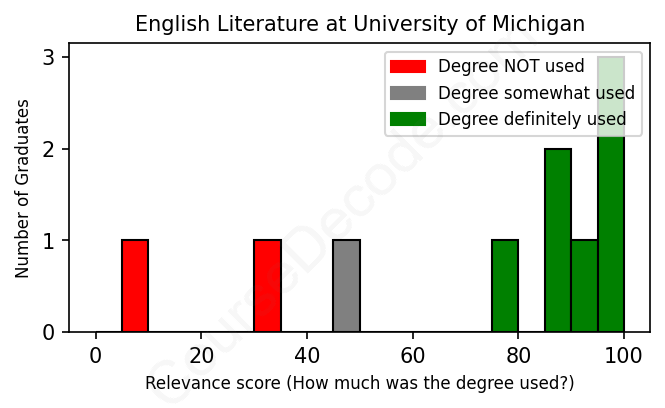
First, some facts. Of the English Literature graduates from University of Michigan we've analyzed , here's how many have used (or NOT used) their degree in their career:

These are estimates based on AI analysis of 10 LinkedIn profiles (see below).
The verdict? Slightly above average. Overall, with an average relevance score of 72%, English Literature graduates from University of Michigan have a slightly higher likelihood (+5%) of finding work in this field compared to the average graduate across all fields:
And for comparison, here's the chart for all profiles we've looked at across all degrees.
Also, after graduating, 40% of these graduates have pursued further education other than another Bachelor's degree (such as a Masters degree or other), compared to the average across all profiles of 35%. This suggests you may need more than just a Bachelors degree to be competitive as a English Literature graduate.
See the details:
|
Relevance score: 77% We think this person has gone into a career highly relevant to their degree. We think this person has gone into a career highly relevant to their degree.
DEGREE INFOGraduated in 2019 from University of Michigan with a Bachelor of Arts - BA in English Literature. No other secondary education since. JOB HISTORY SINCE GRADUATIONCollege Connections Coordinator University of Michigan College of Literature, Science, and the Arts May 2019 - Sep 2021 Weekly Newsletter Writer  University of Michigan College of Literature, Science, and the Arts Sep 2021 - Apr 2022 Project Manager  Fujitsu Research of America Apr 2022 - Present ABOUTNo information provided. |
The top 10 most common jobs done by the graduates we've analyzed (ranked most common to least) are:
When looking at the career paths of people who studied English Literature at the University of Michigan, a trend emerges: many have gravitated towards roles that involve strong writing, editing, or teaching components. Positions like Freelance Editor, Content Writer, and various teaching roles definitely tap deep into the skills learned in their degree program. It’s pretty clear that those who went into fields like publishing, education, and even writing for companies are utilizing their English Literature background, linking the knowledge gained in university to their everyday work. Teaching jobs, in particular, seem to reflect a strong relevancy, as instructors apply their understanding of literature, writing, and analysis directly with their students.
However, not all paths remain closely tied to English Literature. Some graduates have taken on roles that seem a bit disconnected from their studies. Jobs like Publicity Assistant and logistics-related positions may rely more on general communication skills rather than specific literary skills. Moreover, a few graduates have ended up in roles focused on customer service or administrative tasks that don't really tap into their background in literature at all. While many of these jobs use some skills from their degree, the link isn't strong enough to say they are entirely relevant to what they studied in college. Overall, the jobs taken by these English Literature grads show that while a significant number certainly align well with their degree, there are also plenty of divergent paths that don’t directly utilize that specialization. It’s really a mixed bag!
Here is a visual representation of the most common words in job titles for English Literature graduates (this is across all English Literature graduates we've analyzed, not just those who went to University of Michigan):

Looking at the career trajectories of English Literature graduates from the University of Michigan, it seems like many individuals have carved out paths that are quite relevant to their field of study, especially in roles relating to writing, editing, and teaching. For their first jobs, many grads often start in assistant or editing roles, such as program assistants or freelance editors, which makes sense given their backgrounds. For example, someone who graduated in 2010 began as a Program Assistant, while a 2017 grad worked as a Publicity Assistant. These initial positions seem to help them gain experience and start building a network in the literary and educational sectors.
Fast forward five to ten years, and it looks like these graduates are finding their footing in a mix of creative and educational roles. Many of them transition into higher positions within publishing and education, such as copy editors, digital managing editors, and teachers that allow them to leverage their literary skills. However, there are also cases where the paths diverge significantly; for instance, a grad shifted from internships in literary magazines to roles in logistics with RXO, Inc., which might not use their degree as directly. While overall, the majority appear to be using their English Literature backgrounds effectively, it’s clear that some end up in unexpected or less related careers. So, while there’s definitely a solid number of graduates doing well in their fields, others may find themselves in roles that feel a bit off the beaten path for an English Literature major.
Honestly, a Bachelor’s degree in English Literature, whether at the University of Michigan or elsewhere, can be a bit of a mixed bag. It definitely has its challenges, but it can also be super rewarding if you’re passionate about reading and writing. You’ll find yourself diving into a lot of texts, analyzing them, and expressing your thoughts through essays and discussions, which can be pretty intense if you’re not used to that level of academic writing. That said, if you enjoy literature and have a knack for critical thinking, you might find it more manageable. So, while it’s not the easiest degree out there, it’s not the hardest either; it really depends on your interest and dedication to the subject.
Most commonly, in the LinkedIn profiles we've looked at, it takes people 4 years to finish a Bachelor degree in English Literature.
Looking at the job paths of these English Literature grads from the University of Michigan, it seems like they've had a pretty solid run overall, but it's a mixed bag when it comes to big bucks. Many of them started in lower-paying roles like teaching or internships, which is pretty common in the literary field, and even moving to more specialized jobs like publicists or editors can still mean mid-range salaries. For instance, the grad who ended up at Nike likely makes decent money, but others seem to be in roles that are still growing in salary potential. Those who’ve worked their way up in companies or transitioned into strategic roles seem to be on the right track. So, while some are probably doing fine, it's safe to say that the path to decent money in English Lit often takes time and a bit of luck.
Here is a visual representation of the most common words seen in the "about" section of LinkedIn profiles who have a Bachelor degree in English Literature (this is across all English Literature graduates we've analyzed, not just those who went to University of Michigan). This may or may not be useful:

Here are all colleges offering a Bachelor degree in English Literature (ordered by the average relevance score of their English Literature graduates, best to worst) where we have analyzed at least 10 of their graduates: